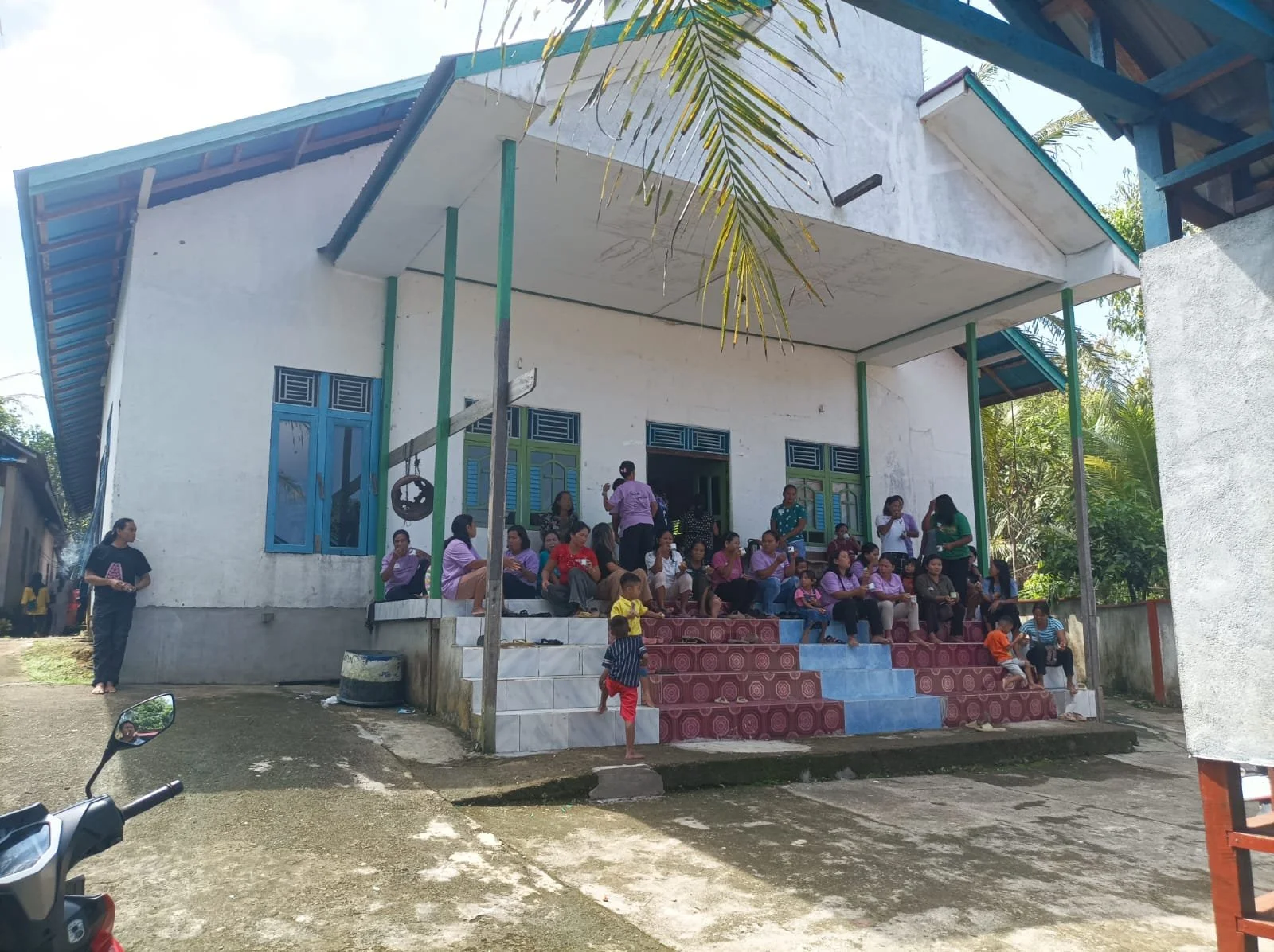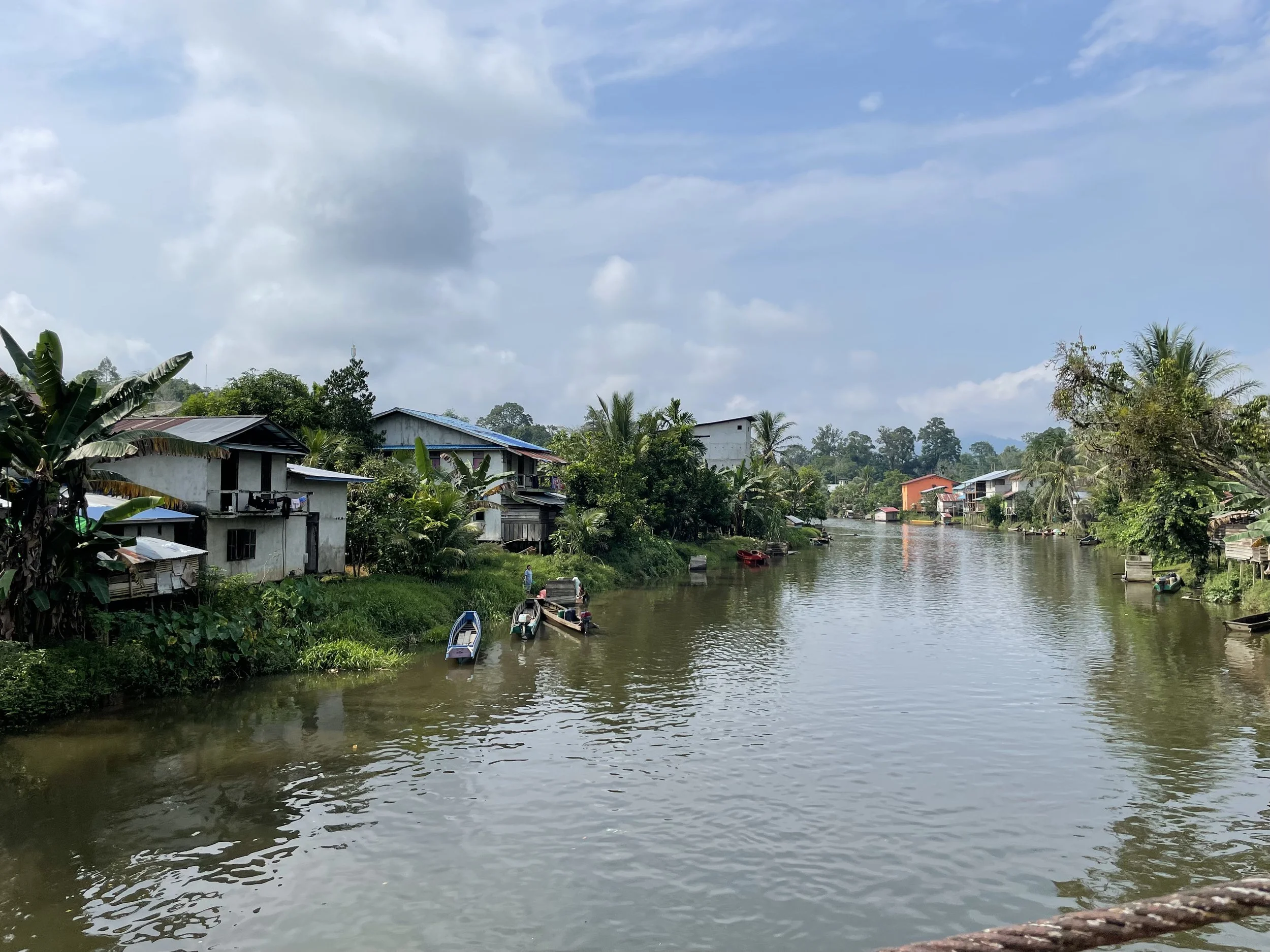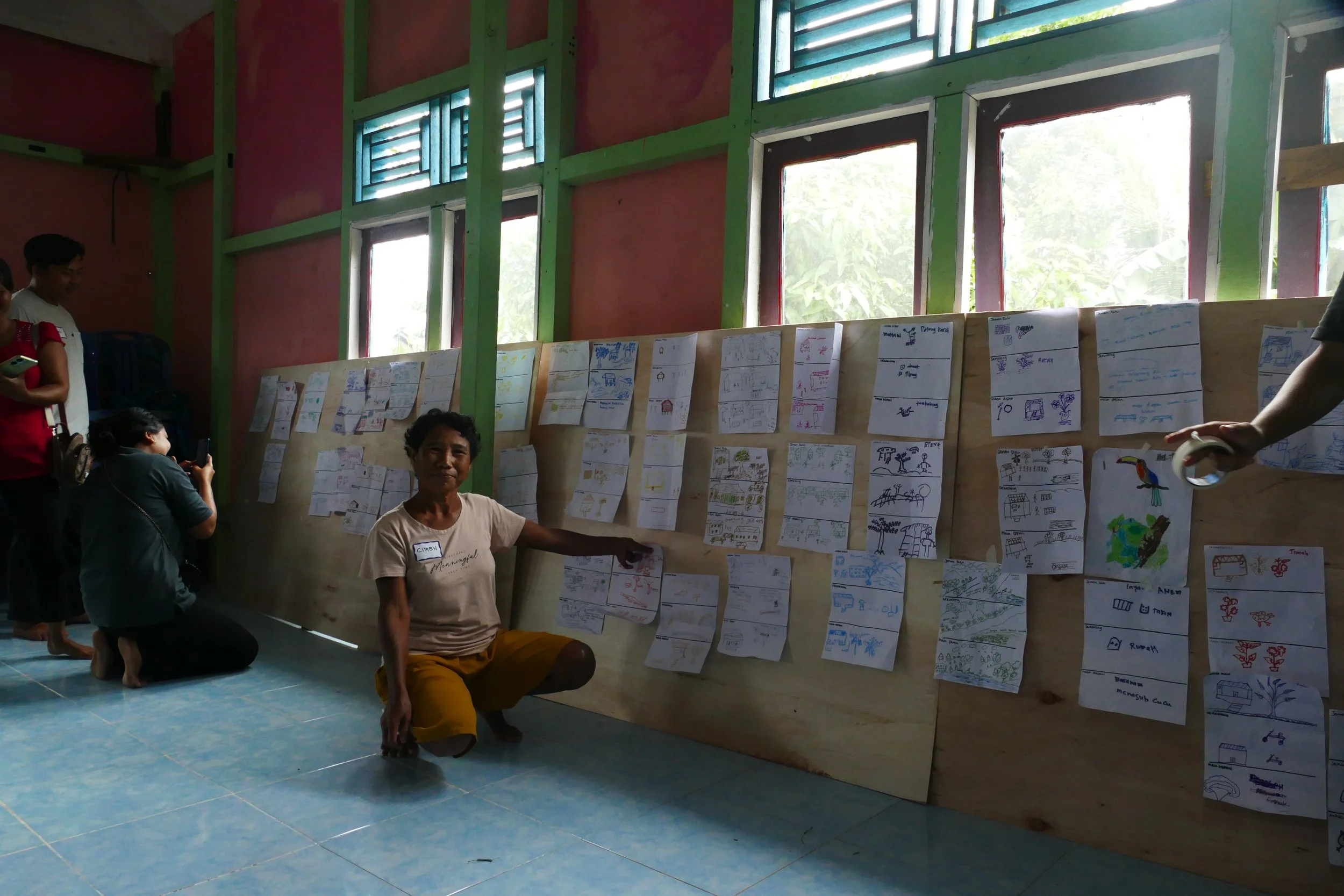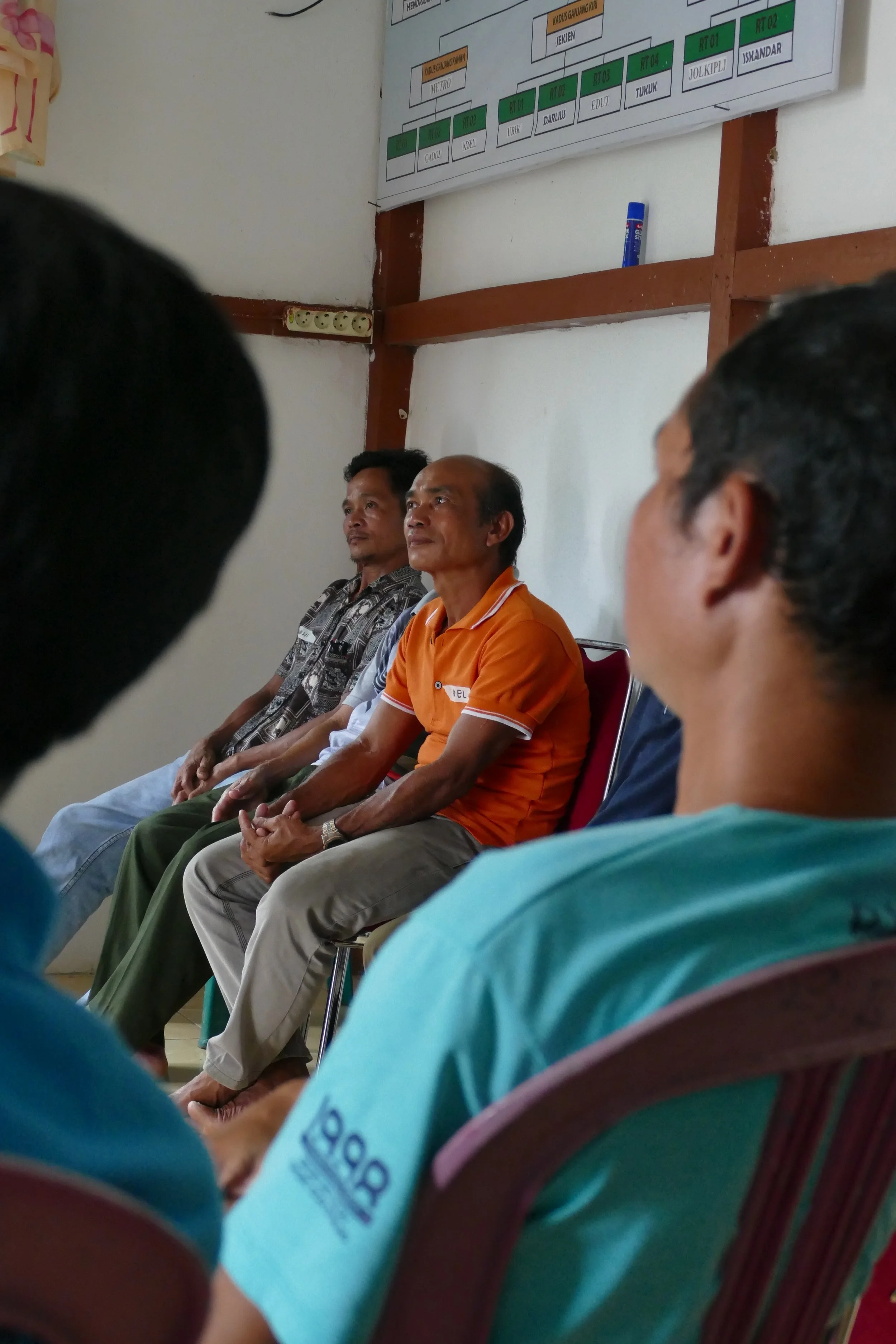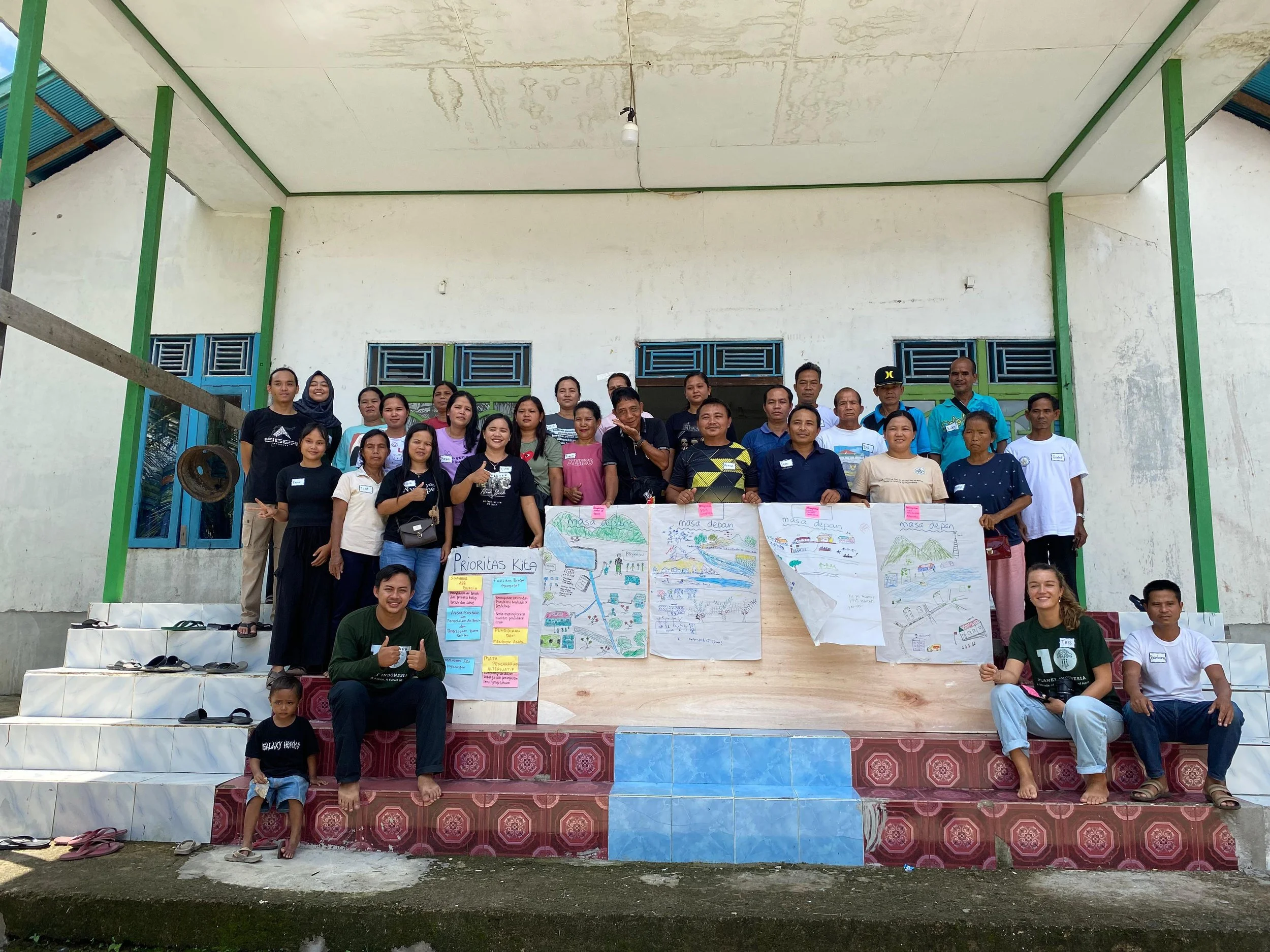Strengthening our Radical Listening: Staying committed to community leadership in times of growth
By Tess de Jongh
Women gather at the village church in Ganjang
On the first morning in our new partner village of Ganjang, we were waiting for the women from the community to arrive for our initial focus group discussion. Heavy rain pounded the tin roof of the church we were using as a gathering space. We worried no one would come. But then, one by one, women began to arrive, soaked, shy, but determined. Before long, 60 women had filled the benches, sketching out their hopes for the future and raising concerns about polluted rivers, gold mining, and their children’s futures.
This gathering takes place as Planet Indonesia explores new partnerships with villages around the largest remaining continuous forest in West Borneo, the Gunung Nanning forest. It follows on from a story we shared last year, about black bags and the assumptions we bring—often unknowingly—into our work, especially when expanding to new areas. As our organization grows and reaches new places, the pull to replicate what has worked before can become quite strong. Whilst scaling successes can be an effective growth strategy, there is a tendency to lose sight of foundational values and principles as the scale of work expands. To stay grounded, we felt it was the right time to revisit our core principles and explore how we can continue to support work that is truly community-led, especially as we grow.
A Special Invitation
Not long after our team made their initial visits to Melawi district - in the heart of Indonesian Borneo - to meet with the respective village heads, a special invitation landed on our doormat. The village leaders had agreed to pursue a potential partnership with Planet Indonesia and invited us to meet with the broader community. Grounded in our core values, this presented an unique opportunity to strengthen our radical listening (Plude & Webb, 2025) approach; a methodology adopted from Health In Harmony for collaborative programme development alongside local and Indigenous communities, which forms the foundation of community-led conservation agendas. At Planet Indonesia, we spend a lot of time and resources into radical listening - exploring community-identified priorities through focus group discussions and in-depth interviews. After 10 years of practice, we explored if we can enrich this process with new tools.
View from the bridge over Ganjang Village
With support from our partners at Legado, we added new tools and methods to revamp our radical listening practice. Legado’s Thriving Futures framework—designed to help communities articulate their own vision for the future of both their people and their landscape—offers a powerful complement to our existing tools. It adopts a 360° Community-Led Change approach, which recognizes the intersectionality of the different dimensions (e.g. livelihoods, governance, environmental health, human health) that constitute well-being.
By focusing on personal and communal legacies, Legado’s approach increases a sense of agency over one’s future and capacity to take collective action. Planet Indonesia previously used interactive methods to explore the hopes and needs of communities, but we used a structured format divided into three dimensions of economy, environment, and health & wellbeing. This method gave us good insights of community perceptions, but it risked important topics slipping through and missing the articulation of how these matters are related. Thus, we decided to adopt some of Legado’s methods to bring with us to Melawi, alongside a team of trained facilitators, many flipcharts, colourpens, and drawing paper.
Community member pointing out to the collection board with all the individual legacy drawings
Radical Listening Revamped
With great anticipation and a little nervousness, we made the two-day journey from Pontianak to Melawi again. Upon arrival in the village, spirits were high, and we were received with great hospitality. After a bit of chit-chat over some cups of hot kopi on the veranda, we got straight to work. Over the course of one week, we came together with the women, men, and leaders of the village. Through a series of participatory workshops, individuals crafted personal legacy plans - drawings expressing their history, current situation, and future vision - and participated in group discussions about what a thriving future for Ganjang could look like. From clean water access to education, environmental protection to cultural preservation—these conversations went far beyond daily small talk. They created space for neighbours to discuss matters that can make or break a thriving future.
Community members voting for the matters that they consider most important for a Thriving Future
Community member drawing the agreed score on the 'Florecita' worksheet
Women pasting their personal Legacy drawings on the collection board
The thoughts shared were captured by our note-taking team and verified on the second day with the same people who had contributed them. After ensuring we got the right messages, on day two, we focused on prioritising the identified aspects into what is most important for achieving a thriving future for the community. We talked about things that need to be maintained, such as cultural practices and communal meetings, as well as things that need to be improved or restored, such as waste management and preparing youths for the future.
Community members engaged in interactive discussions around the different dimensions of a thriving future
Finally, through individual voting and group discussions, each group (women, mixed, and leaders) filtered these matters to a list of three top priorities for the near future. After all groups had undergone this process, the week ended with a final consensus convening. In the same church, we gathered representatives from all three groups to present their selected priorities.
Some spoke about road access and healthcare, others about access to higher education and alternative livelihoods, but all groups shared one priority: clean water access. A final round of discussion and voting led to a shared list of priorities:
Clean water access & management,
Improved education facilities and children’s motivation to learn
Alternative livelihoods and improved livelihood knowledge
Sustainable natural resource management.
Communities with Assets
This week wasn’t just about discussing the challenges the community faces. It was also about recognizing the assets that already exist within the community—the skills, knowledge, and resources built over years of lived experience and knowledge transfer. Listening to and learning from local experts about the area that receives global conservation attention allows us to provide support where it truly matters. By building new partnerships from a place of shared strengths and assets, the process challenges the all-too-common narrative that rural communities are simply in need. Instead, as we’ve seen across Indonesia, communities like Ganjang are very capable of leading climate action and sustainable development—if given the space and support to do so on their own terms.
View over the river that runs through Ganjang village
Investing in this kind of participatory, co-designed approach takes time, but it also builds ownership, trust, and ultimately, more durable solutions. Rather than bringing in pre-packaged programs, staying truly community-led means continuously listening, challenging assumptions, and adjusting where needed. Experience may help us to be more efficient in identifying what could and could not work, but staying true to foundational processes is key and a worthwhile investment. We're reminded once again that the most meaningful change becomes possible when communities define what matters most to them.
As an organization committed to community-led governance in the face of climate change, we know our values must be more than words on paper. They must shape how we listen, how we design, and how we act. Our experience in Ganjang is a powerful affirmation that by staying true to these principles—and by embracing new tools that help us do so—we can continue to evolve without losing our way.
If you have any questions please reach out via admin@planetindonesia.org. Sign up for our newsletter and follow us on our social media Facebook here, Instagram here, and LinkedIn here to get timely updates on our activities, an insider’s look into the lives of front-line conservationists, and ongoing programs.

